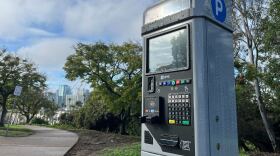Speaker 1: (00:00)
Southwestern college has a history with anti-black discrimination and racial tension on campus. And now the college has been named this year's equity champion of higher education by the nonprofit campaign for college opportunity. That recognition is for their work in awarding associate degrees for transfer to black and Latin X students. They say it's a key part of moving the college beyond its recent past. Joining me is Jenelle Williams. Melindres Southwestern college's executive officer of equity and engagement. Janell. Welcome.
Speaker 2: (00:34)
Thank you so much for having me. I appreciate it.
Speaker 1: (00:37)
So first for those who may not know what is an associate degree for transfer,
Speaker 2: (00:43)
It is pretty much a pathway that allows students to be able to clearly go into a major. So, uh, long ago, when students wanted to go to a CSU, they had to look at each CSU for that major and do the preparation for each one of those. And they might be different. What an ADT does is kind of consolidates all of that. So no matter which school you want to go to, if you're going to major in say political science, you have the same preparation for the major to get into any of those CSU.
Speaker 1: (01:17)
And talk to me more about that. How do these degrees help students reach their transfer goals?
Speaker 2: (01:22)
Well, in order to transfer students usually need somewhere around 60 units, have preparation for the major completed and have, you know, any electives or, um, major classes that are needed, done and completed. However, um, when you, most students have several schools in mind. And so in order to prepare for that, sometimes it would be a little difficult because this school wants one thing and this other school wants something else. And so really when you're talking about ADTs, it helps students to be able to prepare for several different schools at one time and stay on track with what their goals are rather than, uh, sometimes depending on the major, you could have very different paths to getting there. So maybe you have one or two classes in common, but then you would do another six units for this school and 12 units for that school. And it would be very different.
Speaker 2: (02:15)
And so by consolidating it down with an ADT, helping students to stay around that 60 units that's needed and not going up above that for the most part, it really helps them to get out faster and then also helps them not taking, um, for not taking classes that they don't need. So if I ended up going say to San Jose state, but I also was, was applying to San Diego state. Those classes that I didn't need for San Jose state are no longer. Now part of my record, I didn't have to prepare for those things. So it helps consolidate it also limits the number of units that they take, just so they can get through Southwestern college and faster,
Speaker 1: (02:55)
According to a report by the campaign for college opportunity, only 15% of Latin X college students and 28% of black college students obtain a bachelor's degree. Uh, what have been some barriers to achieving these degrees and how have you all been able to overcome them?
Speaker 2: (03:11)
There are all kinds of barriers and not even we haven't even started to touch the pandemic, right? Not to mention, you know, the added responsibilities that students have, uh, especially black and Latinex students. When we're talking about our family responsibilities, having to have another, another job at the same time that we're going to school, not always being able to be a full-time student, all of those things can really add to the competing priorities that students face. And that's why the ADTs are so wonderful because it, again, limits the amount of extra work that students are doing and provides this clear pathway into what it is that they want to major in.
Speaker 1: (03:51)
Talk about how this achievement fits into the work of diversity, equity and inclusion.
Speaker 2: (03:57)
It is right in the pocket, right? So when we're talking about diversity, equity and inclusion, what we're talking about is looking at traditional structures and bringing about equitable structures. So not ones that are only designed for some to succeed, but once we're, all of our students are able to thrive. And so looking at ADTs, what we have seen is for, um, for those who may not have been, uh, uh, familiar with ADTs when the students are completing 60 units, that means that any one of those 30, what we have ADTs now, um, they're guaranteed admission to the California state university system in that major. So it is a guarantee for them to get in, again, another one of those ways where when we're talking about equity, it means that we want people to have access to education. You talked about the numbers with black and Latinex students not achieving, um, those degrees. Well, when you have a guaranteed to transfer, that helps tremendously. So that is definitely in line with our equity goals, helping to make sure that all of our students succeed, but as a proud Hispanic serving institution, wanting to make sure that our Latinex students are, are, um, moving through our system and we are providing the services to support them, to be able to do that as well as all of our students in that same vein.
Speaker 1: (05:20)
And this recognition from the campaign for college opportunity is a turnaround for Southwestern. The college has had a troubled past with anti-black discrimination and racial tension. How is the institution working to change that for both students and faculty?
Speaker 2: (05:36)
Well, this work has been happening for a long time. We are so happy to be recognized for sure. Um, and the work that we continue to do is really in line with making sure, like I said, that all students and employees for that matter, uh, thrive, it has been our intentional work to make sure that we are helping students to reach their educational goals. We have for many, many years, um, had lots of learning communities that support our students and other programs that support our students, including black brother learned leadership academy, the Moja program, learning community, the point they learning community buy-on, which focuses on a Filipino student experience, Chell, which is LGBTQ, um, and their learning experience as well as our first year experience program that reaches over 600 students. And so all of these things have been a part of what we do for Southwestern. And we are just so thrilled that we are starting to get recognized for all of that good work that has been happening here.
Speaker 1: (06:41)
And what does this recognition, the 2021 equity champion of higher education mean to Southwestern college?
Speaker 2: (06:48)
We are just so proud to be recognized in this way, what it means is that we're doing what we've set out to do. It means ultimately that, um, our students are moving in the direction of thriving, right? Which is exactly what we want. And it's also a nod to all of the employees that help to make that happen. So for us, it means that we are moving in the right direction and, and we plan to continue to do,
Speaker 1: (07:12)
I've been speaking with Jenelle Williams, Melendez, Southwestern college's executive officer of equity and engagement Jenelle. Thank you so much for joining us.
Speaker 2: (07:21)
Oh, thank you so much. It was my pleasure.






